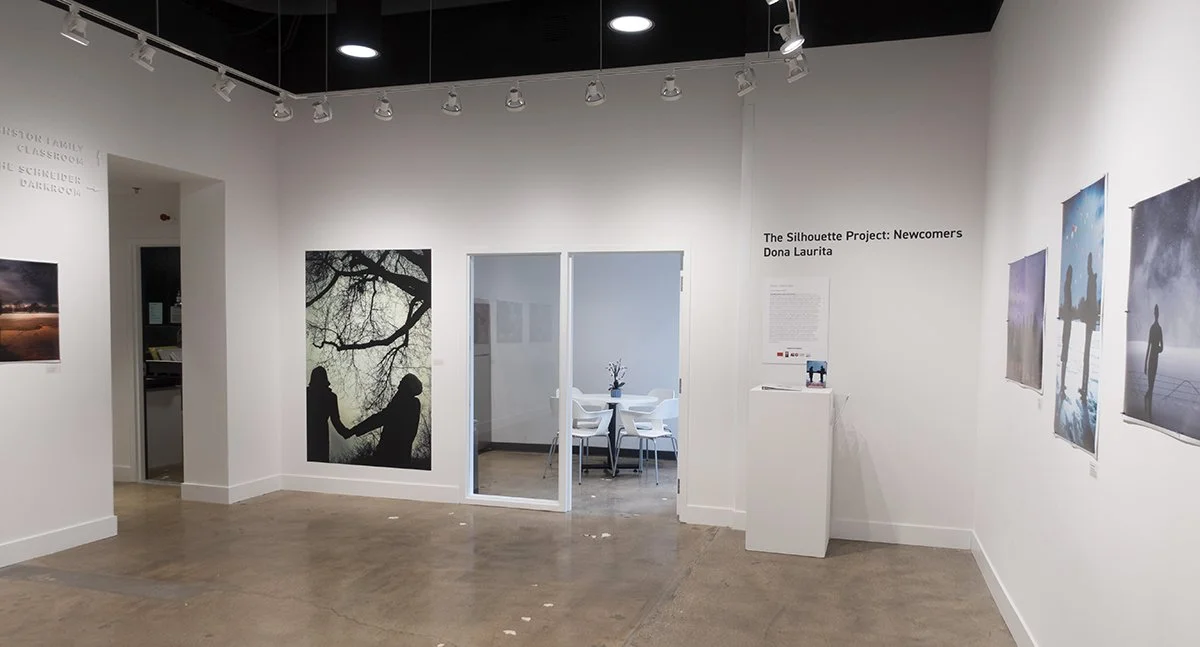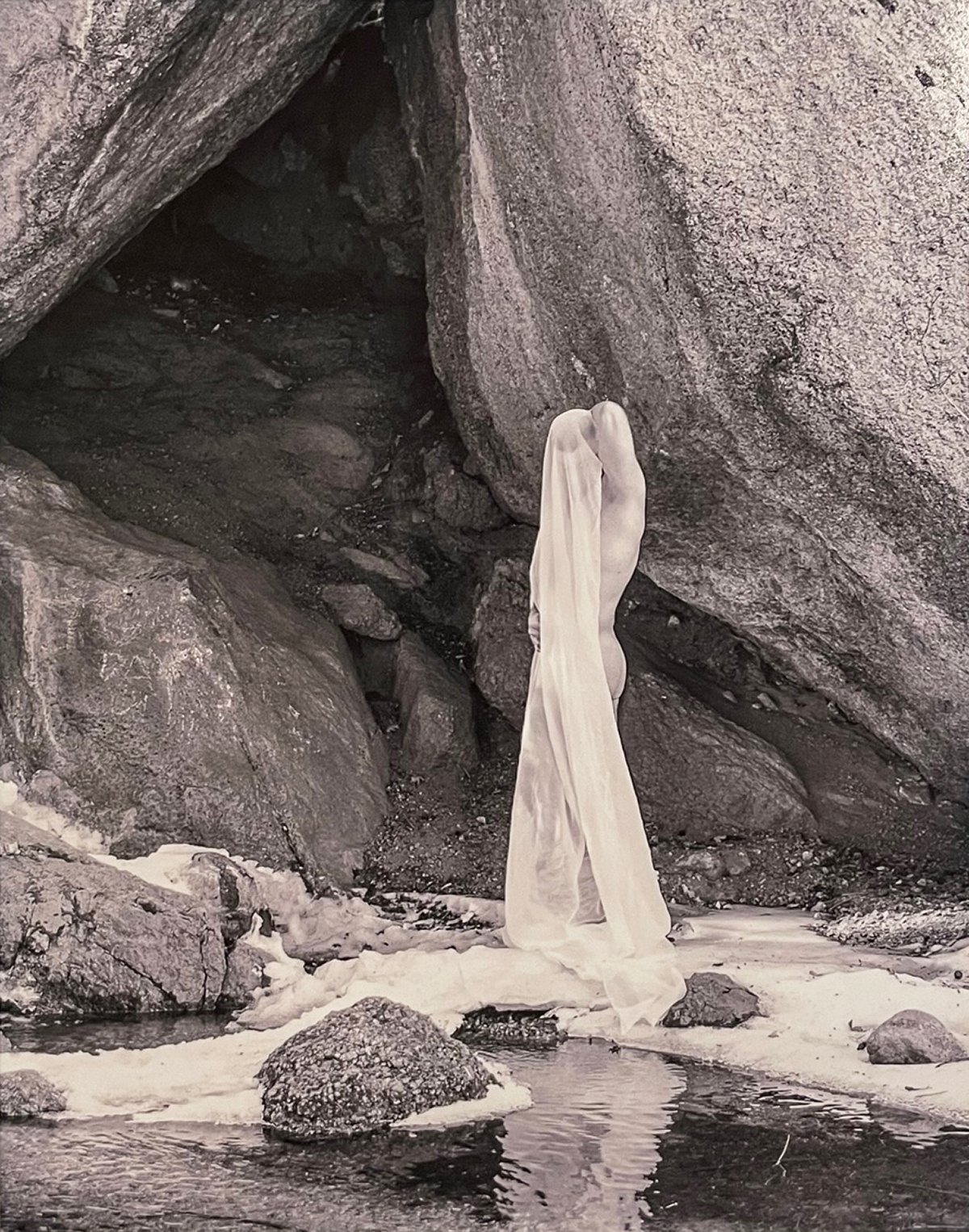The Presence of Absence/The Silhouette Project: Newcomers
Inbal Abergil: The Presence of Absence / Dona Laurita: The Silhouette Project: Newcomers
Colorado Photographic Arts Center
1200 Lincoln Street, Denver, CO 80203
May 10–June 22, 2024
Admission: free
Review by MG Bernard
Two exhibitions dedicated to healing grief, trauma, and loss are currently on view at the Colorado Photographic Arts Center (CPAC). The Presence of Absence by artist Inbal Abergil and The Silhouette Project: Newcomers by photographer Dona Laurita capture two of the consequences perpetrated by war.
An installation view of Inbal Abergil’s The Presence of Absence at Colorado Photographic Arts Center. Image courtesy of CPAC.
The grief, trauma, and loss caused by animosity, violence, and warfare are all too familiar to many of us, especially in our present moment as genocides take place in Palestine and elsewhere. The two exhibitions subtly highlight the atrocities—i.e., death, destruction, displacement, and despair—produced by the American military-industrial complex, the network of individuals and institutions involved in the production of weapons and military technologies. [1] In other words, the two shows unintentionally point out how the military-industrial complex is more focused on capitalistic ventures than keeping the “peace” and protecting citizens.
Inbal Abergil, WHITING, 2014-2024, digital C- Print, 16 x 20 inches. Image courtesy of CPAC.
Inbal Abergil is a New York-based documentary artist, educator, veteran, and mother originally from Jerusalem and of North African descent. Her research focuses on memorializing American military personnel who have died in action during World War II, the Vietnam War, the wars in Afghanistan, and the war in Iraq. At CPAC, The Presence of Absence features selected artworks from Abergil’s two most recent projects N.O.K.: Next of Kin and Four Mothers. [2] For N.O.K., the artist documents how relatives of “fallen soldiers” cope with the loss of their loved ones via the preservation of the dead’s personal and private objects.
Inbal Abergil, PICKETT, 2014-2024, digital C- Print, 20 x 24 inches. Image courtesy of CPAC.
Abergil’s work is showcased in CPAC’s front gallery where framed photographs from the N.O.K. project are assembled next to printed excerpts taken from the artist’s conversations with living relatives. In the far-right corner of the space is a single framed photograph of Tracy Dice-Johnson’s arms covered in large, colorful tattoo sleeves that collectively read in cursive letters: “Ain’t No Sunshine When She’s Gone,” in reference to Bill Wither’s 1971 song “Ain’t No Sunshine.”
Inbal Abergil, JOHNSON, 2014-2024, digital C- Print, 30 x 40 inches. Image courtesy of CPAC.
In a conversation with Abergil, Dice-Johnson explains how the tattoos are memorials to her wife Sgt. Donna R. Johnson, who died while on duty in Afghanistan. She tells of the painful experience of not only losing her wife, but also the military’s refusal to recognize her as her wife’s next of kin. She admits:
“I’m still in the National Guard, yeah. What really makes it hard, because I do love my country. I really, really do, but there are times it feels like it doesn’t love me back, because I only ask them for I think what’s fair. I’m not asking for anything above and beyond. I’m just asking for the right thing to be done. Things to be rectified to where it’s proper, but I get that life’s not fair, it’s not.”
A view of Inbal Abergil’s ORTEGA, 2014-2024, vinyl, 96 x 144 inches (left) and Scoti, 10:18 min video, 2024, from the series Four Mothers (right). Image courtesy of CPAC.
To the left of Tracy’s photograph is an excerpt of Abergil’s short film Four Mothers, featuring an interview with Gold Star mother Scoti Domeij. [3] The video focuses on Domeij, who sits in her living room discussing the experience of losing her son while on duty. During the interview, she states: “This is not something I ever wanted. I didn’t want to join the military.” The loss of Domeij’s son has caused her tremendous pain and grief, and healing from such a horror has been difficult for her. When others tell her “God had a reason,” she responds, “No matter what the reason was doesn’t take the pain away.”
An installation view of Dona Laurita’s The Silhouette Project: Newcomers at CPAC. Image courtesy of CPAC.
Dona Laurita is a Colorado-based documentary photographer. Her work calls attention to marginalized communities by utilizing “the power of the shadow voice” as a template to connect viewers with invisible bodies and minds. [4] The Silhouette Project on view at CPAC is the fourth iteration of the artist’s recurring photographic series where she has photographed and interviewed young adult refugees who have been relocated to Denver, Colorado.
Dona Laurita, I Saw, I Heard, I Felt, 2023, inkjet print, 24 x 36 inches. Image courtesy of CPAC.
Laurita’s large, colorful photographs are featured in CPAC’s back gallery. In the photograph titled I Saw, I Heard, I Felt, the artist places her silhouetted subject amongst red clouds and fireworks. Close to this work is another photograph titled Soaring in Survival, in which Laurita positions two “blacked-out” subjects in a snowy terrain with a big, cloudy sky and birds soaring above them.
Dona Laurita, Soaring in Survival, 2023, inkjet print, 24 x 36 inches. Image courtesy of CPAC.
On a pedestal in a corner of the gallery is a printout of poems written by the unknown subjects in the photographs. Under this respective image in the printout, the poem reads:
“I am from Samangan, Afghanistan.
[…]
I am from a big home. I’m from a big family.
[…]
I am from a bad war country.
I am from a place where kindness and respect are lacking. Women don’t have the right, but we had kind and brave people in the past.
[…]
I am from Afghanistan.”
An installation view of Dona Laurita’s The Silhouette Project: Newcomers at CPAC. Image courtesy of CPAC.
As nonviolence teacher Kazu Haga explains: “Oftentimes, when people talk about healing modalities, those conversations are happening in the absence of an analysis around systemic harm and historical harm.” [5] A lot of the harm we must heal through is the result of systems, such as the American military-industrial complex, that have brought violence to certain communities and not others for hundreds of years. These two exhibitions create a bridge between art and marginalized communities and communities in pain, and they prompt us to continue to critique the failures of the American military-industrial complex.
Mary Grace Bernard (MG, she/her) is a transmedia and performance artist, educator, advocate, and crip witch. Her practice finds itself at the intersection of performance art, transmedia installation art, art scholarship, art writing, curation, and activism.
[1] As the Encyclopedia Britannica explains: “the military-industrial complex in a country typically attempts to marshal political support for continued or increased military spending by the national government.” https://www.britannica.com/topic/military-industrial-complex.
[2] A person’s next of kin is their closest living blood relative, including spouses and adopted family members. According to Cornell’s Legal Information Institute, “the designation as next of kin is important in the context of intestate succession, as a decedent's next of kin is prioritized in receiving inheritance from the decedent's estate.” https://www.law.cornell.edu/cfr/text/32/724.115.
[3] American Gold Star Mothers, Inc., founded in 1928, is a private nonprofit organization of American mothers who have lost children in service of the United States Armed Forces. See https://www.americangoldstarmothers.org/.
[4] From Dona Laurita’s artist statement.
[5] The Horizons Project, “Healing Resistance: A Conversation with Author Kazu Haga”: https://horizonsproject.us/healing-resistance-a-conversation-with-author-kazu-haga-url/.
















